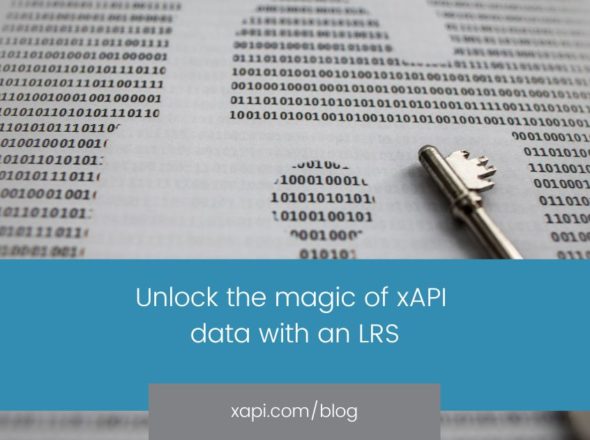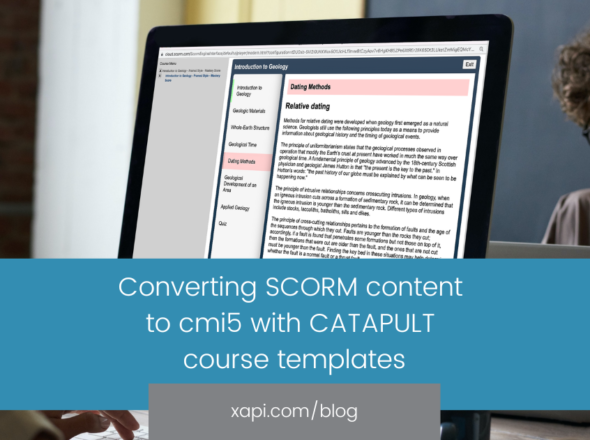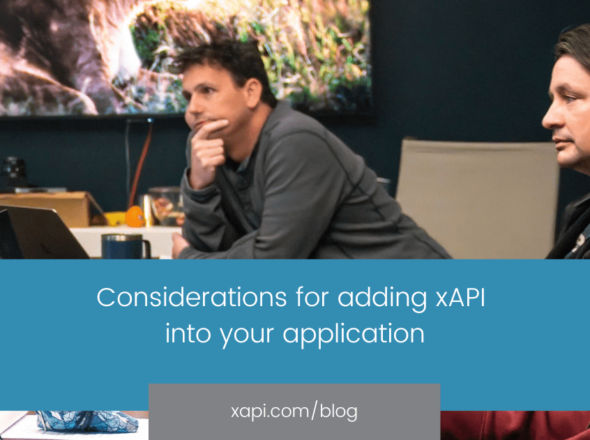We field lots of questions about the basics of xAPI. The most common request is help finding a Learning Record Store (LRS). While there are many LRSs available these days, there are a few different flavors or varieties. Understanding what your requirements and expectations are is important to direct you down the right path. If you need a refresher on LRSs in general, check out “What is a Learning Record Store?”
Recently, our very own Chris Tompkins presented to the xAPI Cohort on this very topic. There are two topics from the session that we’ll expand on here, assuming that you’ve already determined that you need an LRS. If you’re still trying to understand the concept of an LRS and where and how to use it, definitely check out the presentation for an in-depth discussion of each.
What type of LRS do you need?
There are many Learning Record Store options available, and it might be overwhelming navigating all of them. To help you narrow down the choices consider these points.
Build vs buy
xAPI is an open specification, which means you can build one provided you have the developer resources to do so. Alternatives to building your own LRS are off-the-shelf commercial products as well as open source and free options.
Deployment
On-premise or SaaS? Using a hosted or SaaS-based LRS is handy in that managing the servers is one less variable to worry about. But if your organization or use case has specific security requirements, on-premise might be your only option. So look for the options that support your deployment requirements.
Surfacing the data
Don’t overlook the importance of thinking through what happens with the data in your LRS. Many LRSs include tooling to build reports or analytics based on the xAPI data in the LRS. If you already have a reporting or BI tool, you might not need those built-in features.
Which LRSs should you consider?
ADL provides some helpful xAPI resources to help you get started. This brings us to a question from Chris’s webinar that prompted questions around conformance. What does that mean? And how is an xAPI adopter different from a conformant LRS?
xAPI adopters
Let’s start with the ADL xAPI adopter registry. This includes listings for both organizations and LRS product listings. Simply put, you’ll find a list of vendors that have registered themselves as adopters and have incorporated xAPI support into one or more of their products. ADL is very clear that a vendor listing in the xAPI adopter registry does not necessarily mean that their products have implemented xAPI as defined by the specification. Examples here might include authoring tool providers or other applications that utilize xAPI, but where there is not a current mechanism in place to certify conformance to the xAPI specification. This isn’t to say that xAPI products offered by these vendors aren’t up to spec. There simply isn’t any type of testing or certification mechanism in place. On the other hand, LRS products in the xAPI adopter registry have been certified as conformant.
Conformant LRSs
ADL also includes the list of conformant LRSs separately. Why the distinction? Currently the only xAPI products that can be certified for conformance are LRSs. The LRSs listed here have been run through the ADL LRS Test Suite which runs 1,300 tests against the LRS. Upon successful completion of the test, a certificate is issued. Conformant LRS products listed on this site have successfully passed the LRS Test Suite and have provided their certificate of conformance. The product listing page contains information about the product and company, as well as the version of xAPI to which the product conforms.
Key takeaways
If you are going down the path of using an LRS and want to shortcut time and development, it’s best to work with a provider that offers a conformant LRS. These LRSs have been put through rigorous testing and you can be assured that you are using an LRS that follows the xAPI spec. This will pay off greatly as you begin to use xAPI and your LRS more broadly and ensures interoperability across the eLearning ecosystem. In addition, having a clear set of requirements will help you further navigate the selection process when selecting which conformant LRS is right for you.
As always, we’re here to help you in your xAPI journey. Ask us anything, really.


